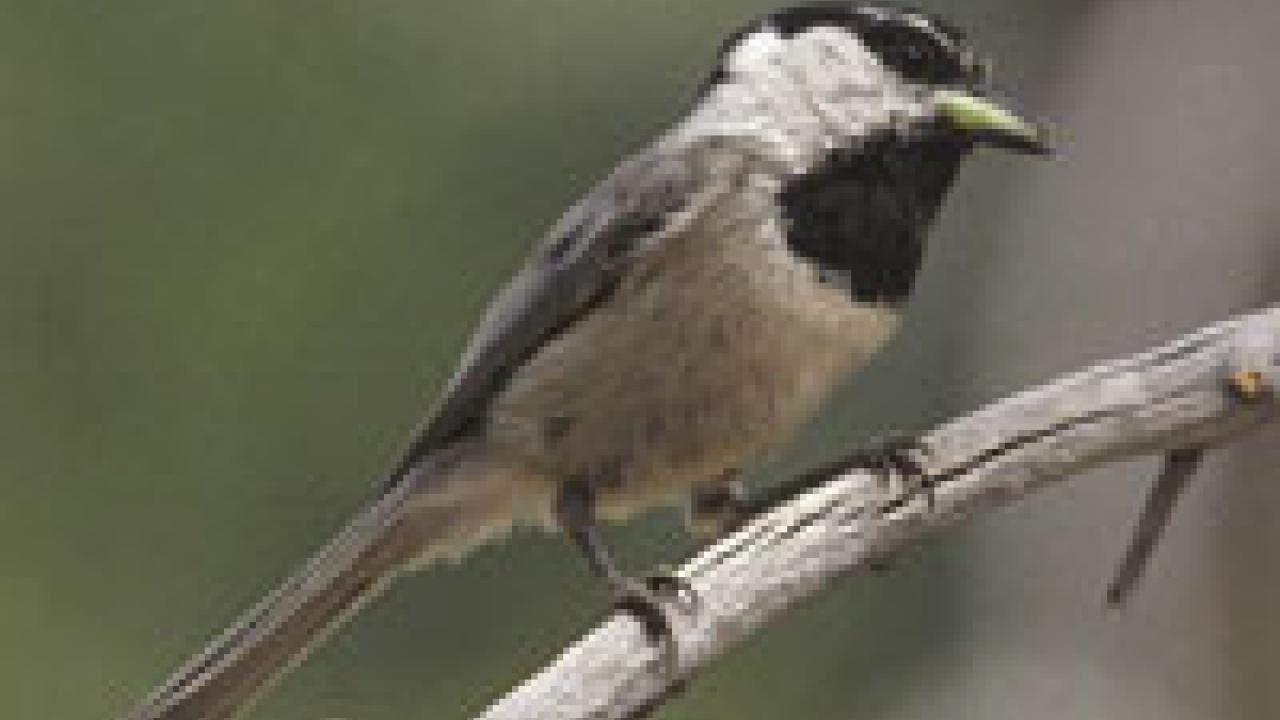Dieters hoarding secret stashes of chips and chocolate have nothing on the black-capped chickadee.
During the late summer and early fall, chickadees hunt down seeds and insects to eat all winter. One tiny bird can cache up to 500,000 food items per year, in individual hiding spots spread over several acres -- and then remembers where the treats are hidden when it's hungry.
The prodigious food caches help chickadees survive extreme winter conditions. "As far north as the forest goes, you find chickadees," says Vladimir Pravosudov, a UC Davis psychology professor who studies memory in food-caching birds. "And they don't migrate. In winter, in forests above the Arctic circle, they experience a few hours of daylight and many hours of darkness."
To survive long, freezing nights, chickadees eat almost continuously while they're awake. Natural yo-yo dieters, they gain 10 to 15 percent body fat during the day, then burn it off each night.
"If they fail to gain fat during the day, they die," Pravosudov says. So it's essential for the birds to remember where they stashed food earlier in the year. "They are heavily dependent on their memories."
Pravosudov, whose research spans the fields of ecology, endocrinology, neurobiology and evolutionary biology, recently discovered that a chickadee's sharp memory gets even better at critical times. His experiments show that mild, chronic stress can improve birds' performance on memory tests. So, the stress caused by a meager food supply may help chickadees remember where they've cached spare provisions.
Challenging traditional views
Pravosudov's findings contradict traditional views of how stress works. Research in other species, including rats and humans, has almost always shown that chronic stress damages memory. Stress hormones, the theory goes, shut down anything that isn't needed for minute-to-minute survival. This shortchanges the hippocampus, the brain area that holds spatial memories.
But most previous work has focused on large fluctuations in stress hormones. In chickadees, the stress of a long, hungry winter only increases hormones two to three times above unstressed levels. "Earlier researchers didn't always think small variations in stress hormones were important," Pravosudov said. "But we wondered what those changes do to an animal's behavior."
Conducting the tests
He found out by conducting laboratory tests on wild chickadees captured in Tahoe National Forest. "It's nearly impossible to study memory in the wild," he says. He tests food-caching memories by watching birds store food and then retrieve the same caches later.
Pravosudov catches chickadees with "mist nets," fine-mesh nets 6 feet tall and several yards wide. The nets, stretched between tall poles, are set up in front of a feeder. When a bird flies into the mesh, it falls into a pocket running along the base of the net.
Back on campus, he transfers the birds to large cages. They dine on birdy treats -- peanuts, pine nuts, sunflower seeds and mealworms -- and vitamin-fortified water. Their cage doors lead directly to the lab where Pravosudov tests their memories. The birds fly to and from experiments, avoiding the stress they would experience if handled.
One wall of the lab is covered with a large pegboard. Above the pegs, which serve as bird perches, are holes just big enough for a pine nut. The entrance to each hole can be covered with a plug attached to the pegboard by a string. The lab also has two "trees" with similar hiding spots in their branches.
Before an experiment, Pravosudov removes a bird's food overnight to make sure it will be hungry. Then he lets the bird into the lab, where pine nuts are waiting. He watches through one-way glass as the bird eats a little, then caches nuts in the hiding spots.
"You have to be very quiet," Pravosudov says. Wild birds are secretive about where they make caches. "If they suspect they're being watched, they won't cache." Hand-raised birds may be even cannier -- they refuse to cache when they sense that someone sits behind the one-way window. He watches those birds by video.
Typically, after about 20 minutes of caching, the chickadee goes back to its cage. Pravosudov covers the hiding spots. Hours later, he lets the bird back into the lab and observes its search for hidden nuts. Birds with the best memories go straight to their caches, ignoring empty hiding spots.
To see how mild, chronic stress affected their memories, Pravosudov implanted chickadees with stress-hormone pellets. The pellets released low levels of hormones over several weeks. On memory tests, birds with hormone implants were better at finding caches than those that got placebo pellets. And the hormone-implanted birds did not experience any detectable damage to the memory-storing hippocampus.
Stress aids in adaptation
Pravosudov thinks his result will change our understanding of stress hormones. He says a threshold effect may be at work -- below the threshold, chronic but moderate stress improves memory, but above the threshold, severe chronic stress impairs it. The benefits of chronic, moderate stress haven't been tested in mammals, but Pravosudov believes they would be similar to those in birds.
"Within a certain range, moderate hormone elevations are good," he says. "They help us adapt to our environment."
Media Resources
Amy Agronis, Dateline, (530) 752-1932, abagronis@ucdavis.edu
